|
Dusty Dog Reviews The whole project is hip, anti-academic, the poetry of reluctant grown-ups, picking noses in church. An enjoyable romp! Though also serious. |

|
Nick DiSpoldo, Small Press Review (on Children, Churches and Daddies, April 1997) Children, Churches and Daddies is eclectic, alive and is as contemporary as tomorrow’s news. |
Volume 216, January 2011
The Unreligious, Non-Family-Oriented Literary and Art Magazine
Internet ISSN 1555-1555, print ISSN 1068-5154
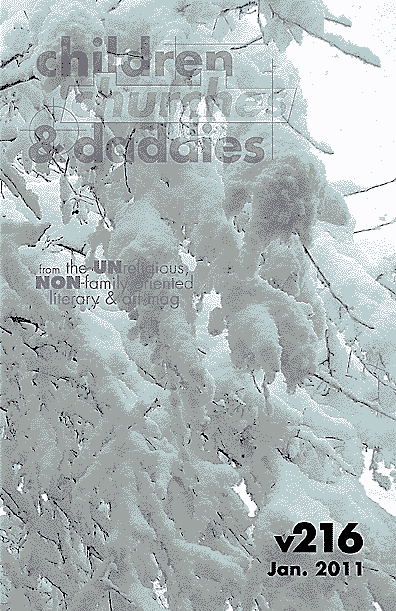
see what’s in this issue...
Note that in the print edition of cc&d magazine, all artwork within the pages of the book appear in black and white.
|
Order this issue from our printer as an ISSN# paperback book: or as the ISBN# book “Into the White”: |

poetry
the passionate stuff
Going Against My GrainCEE
humans are a headache
women are six times more susceptible
|
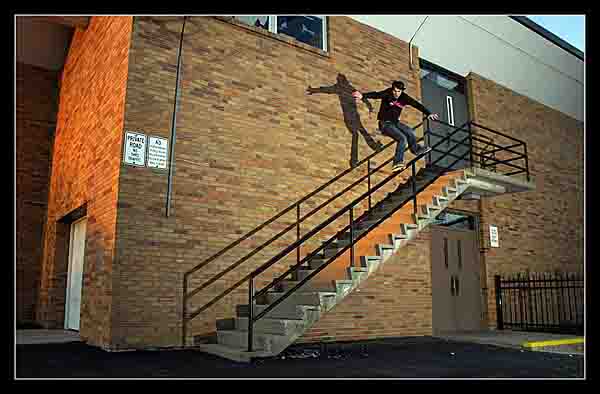
Front Side, art by Nick Brazinsky
MaritalJe’free
We were once so thrilled that not even
And counting debris of our original oneness
We could be gathering stars, and returning our sight
|
midnight passersbyJohn Thompsonauthor of ‘black petal rose’
i cannot see my feet
|

Mountains, art by Brian Hosey
DraculaNatascha Tallowin
Onto the open veranda,
|
Natascha Tallowin BioNatascha Tallowin is a writer and poet from Suffolk, England. Whilst most of her time is spent writing poetry and sitting in patches of sunlight on the floor listening to David Bowie, she is also working on a magic-realism novel entitled ‘Guylian’s Magic’.
|
When Jesoo falls ill, I, Dr Fred Hammy,Fritz Hamilton
When Jesoo falls ill, I, Dr Fred Hammy,
discover he’s swallowed the cross/ I
one of the rusty nails has pierced his
lockdick & his balls fall off/ I, Dr Fred Hammy,
pay me some bread, but he stiffs me like
Jesoo, but I want to be paid/ I, Dr Fred Hammy, am
is burning me/ he’s probably cross about the cross, &
this just pisses Jesoo off more, much
Daddy is still going to do it to him/ He’s even joined
grow up with the poor & favors them mightily/ Daddy
gold in the tithing plate?/ so
British Petroleum gives Daddy the key to the
pelican coated with gulp gulp gulp ... !
|
CivilizationChangming Yuan
Eat MacDonald’s or Kentucky Chicken Quasi Americans, welcome aboard
|
Changming Yuan BioChangming Yuan, two-time Pushcart nominee and author of Chansons of a Chinaman (2009) and Politics and Poetics (2009), who grew up in rural China and published several books before moving to Canada, currently teaches writing in Vancouver and has had poetry appearing in Barrow Street, Best Canadian Poetry, CC&D, Exquisite Corpse, London Magazine and 270 other literary publications worldwide.
|
DebutLana Santorelli
she offered herself
|
| Janet Kuypers reading the Lana Santorelli poem Debut from cc&d magazine, v216 (the 01/11 issue) available as both a 84 page ISSN# issue and the ISBN# book Into the White |
|
Watch this YouTube video read live 01/18/11, live at the Café in Chicago |
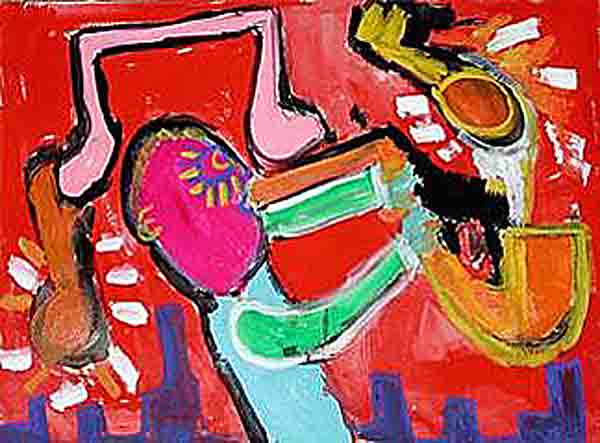
Parker Blows Hard, painting by Jay Marvin
We’re Not ChildrenCarol Garth Children are told to “stop, look, and listen” before crossing the street.Shall I say to you:
Stop. Or shall I say:
Don’t stop.
|

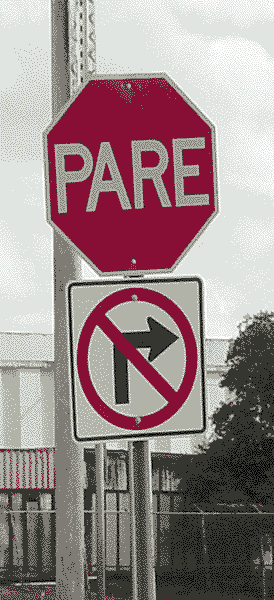

turn your headMaxwell Baumbach
hiding behind shhh
|
| enjoy video of part one of the Maxwell Baumbach Feature which includes this poem (and also has an intro of Maxwell Baumbach poetry accepted in issues of cc&d magazine by editor and the Café host Janet Kuypers) |
|
|
Maxwell Baumbach BioMaxwell Baumbach is a writer from Elmhurst, Illinois. You can see him at www.youtube.com/MaxwellThePoet. He is also the editor of the new publication Heavy Hands Ink. His work has appeared in Opium Poetry 2.0, The Cynic Online Magazine, Thunderclap!, Record Magazine, Black-Listed Magazine, and Five Fishes Journal. It is upcoming in vox poetica, Yes, Poetry, Clutching at Straws, and The Shine Journal. He enjoys watching pro wrestling, which is totally real, as well as reading obscene amounts of poetry.
|
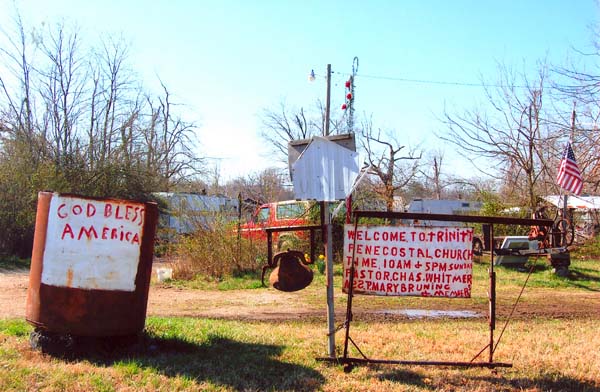
God Bless America, art by David Thompson
New VadaHank Sosnowski
Sage brushed
|
BioHenry Sosnowski
|
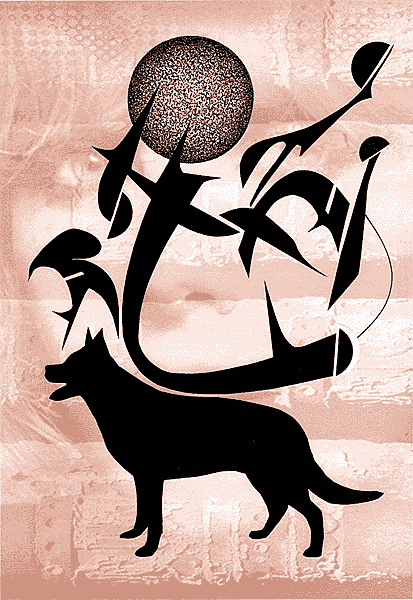
2RFKUZEYIR CAYCI 16-06-2010, art by Üzeyir Lokman ÇAYCI
My GrandfatherHank Threadgill
was born in 1871, the year
|
Hank Threadgill bioHank Threadgill was raised near the Fort Worth stockyards in North Texas, in a neighborhood they used to call “Hell’s Half Acre.” A former musical instrument salesman and the son of a Southern Baptist preacher, Hank relocated to Arlington, TX in the late 1940s, where he has slowly seen open fields turn into parking lots. He was born in 1922, the same year as Kurt Vonnegut, Jack Kerouac, and Howard Zinn, though he rarely esteems himself worthy of such marvelous company. His poetry has appeared sporadically over the years in many journals that are now defunct, such as: Backboard Quarterly, Sign Waves, The Hemlock Review, Time & Again, Gone Fishing, Glossolalia, Fail Swoop, The Vicambulist, and Zero Ducats.
|
Thinking. I hate that.Janet Kuypers08/05/10
I think the reason why I’m doing this
and I have stories with MY cancer bracelet
and I think about the cancer I hate that.
|
| the Janet Kuypers poem Thinking. I Hate That. from the January 2011 issue (v216) of the lit mag cc&d magazine (which is also available as a 6" x 9" ISBN# book Into the White |

Watch this YouTube video read live 01/25/11 from the ISBN# & ISSN# book a Wake-up Call from Tradition, live at the Café in Chicago |
|
the introduction to the Café and the poems “Getaway”, “Couldn’t Take It Home”, “His Mom’s Car” and “At Least That’s What I Hear”, read from the ISBN# & ISSN# book a Wake-up Call from Tradition... Then the poem “Thinking. I Hate That.” from the January 2011 issue (v216) of the lit mag cc&d magazine (which is also available as a 6" x 9" ISBN# book Into the White |

Watch this YouTube video of the intro at the the Café Chicago open mic 01/25/11 & the poems Getaway, Couldn’t Take It Home, His Mom’s Car, At Least That’s What I Hear, and Thinking. I Hate That. |
| “Thinking. I Hate That.” was previously published in Heavy Hands Ink |
Keep me SaneJanet Kuypers08/05/10
I keep seeing you appearing places
I need to have these
|
|
Janet Kuypers reading her poem Keep me Sane |

Watch this YouTube video live at the Café in Chicago 08/10/10 |

Watch this YouTube video of the intro from the open mic @ the Café in Chicago 08/10/10, w/ Kuypers reading this poem - and more |
Macchu PichuRebecca Shepard
slabs of rock
we must remember in daylight
we must share every particle
we must love as possessively
we must worship the rock
I used to imagine
I used to think
I want to know
I want to caress the face
|
Next of Kin Have Been Informed
Copyright R. N. Taber 2010 |
A Place to Stand to Move the EarthJon Mathewson
Candlewood Lake, long ago, with summer
friends whose names and faces have all faded
on the shores of Lake Champlain while looking
and saw the shadows of craters floating
another summer, other summer friends,
to a crater with amazing edges
looking at a map, learning the crater
I see the less interesting neighbors
in future years, with friends known and unknown
|

prose
the meat and potatoes stuff
Rex Rutherford’s LandDerek V. Hunter
The lazy heat glowed over and into the three-story apartment complex on 11th and Westmoreland in the middle of January. This year, as for most years, there wasn’t much gloom in the skies during a month when the rest of the country was frosty and dark. It was true that even June was gloomier in Los Angeles. This January just had sporadic shots of heat that weren’t very shocking, thus, the laziness of it. The apartment building sponged the heat, though, letting whatever warmth there was creep in easily to the apartments.
|
International FinanceJohn Duncklee
During the sixties and seventies life along the Arizona Sonora border was comfortable. Most residents on both sides were comfortable in both English and Spanish. Both sides retained their strongest cultural differences, but many of those became common in time. Length of residency was a determining factor. Except for four years during the Korean War, Jake Baker had lived along the border all of his life. The border meant nothing to him and he spent as much if not more of his time on the Mexican side as he did in Arizona.
|

The JobAnne Turner Taub
Disbelief oozed out of every pore. Disbelief alternating with total numbness. Is this what they mean by denial, Martha Gilmartin wondered. Whatever it was, she was denying it right down to her stomach, which thought it was on a roller coaster hurtling earthward. After l5 years in a job which she had loved, she had been told that she must leave in one week. Downsizing, they called it—a horrible word. She felt downsized all right, her normal 5 feet five height felt as though she were two inches tall. She was 61. Where was she to go? Who would hire her now? She had felt very proud that she still had a job while others her age lived on pensions or social security. It had given her a feeling of confidence and a secret sense of superiority to everyone of her peers without a job. Now she felt totally powerless—her whole identity as a human being gone.
That’s what she was—a flower, really a weed, by the river waiting to be washed away by the next wave that came along. What’s with the self-pity, she told herself, that won’t help but I don’t care.
|
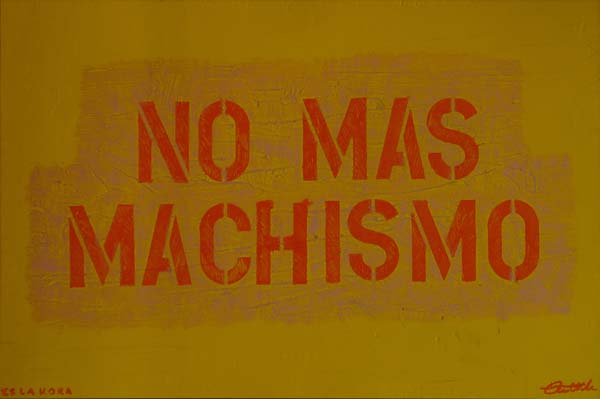
Es la Hora, art by Aaron Wilder
ChokingMike Carson
The foreman finds the man’s body shortly after three in the afternoon. He sees the vivid orange of a safety vest sticking out of the snow at the base of a felled tree. He digs away only enough snow to see that a man is wearing the vest and that the man is not breathing. The foreman knows the dead faller well; they were once good friends.
I’m sitting on the deck and it’s quiet and dark and I don’t know how all of this will turn out but I figure I owe Jurgen more than a thank you. I guess I will go to work tomorrow. Hell, I’ll work all summer and save up some money and in the fall, who knows? Maybe the local college is worth a shot.
|
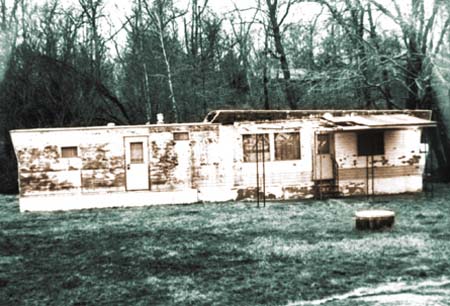
Brief Bio: Mike Carson is a full-time high-school teacher and part-time writer who would like to be a full-time writer and part-time teacher. Mike holds a B.A. (English Literature) from Simon Fraser University, and an M.Ed. (Curriculum) from the University of Northern British Columbia. He lives in Prince George with his wife, Lisa, and ten-year-old twin sons, Daniel and Matthew. His work has appeared in The London Magazine, Tall Tales and Short Stories, B.C. Outfitter Magazine, Otherwords (publication of the now defunct BC Festival of the Arts), and UNBC’s Reflections on Water. “Choking” received Honourable Mention in the 2009 Surrey International Writers’ Conference Storyteller’s Award Contest.
|
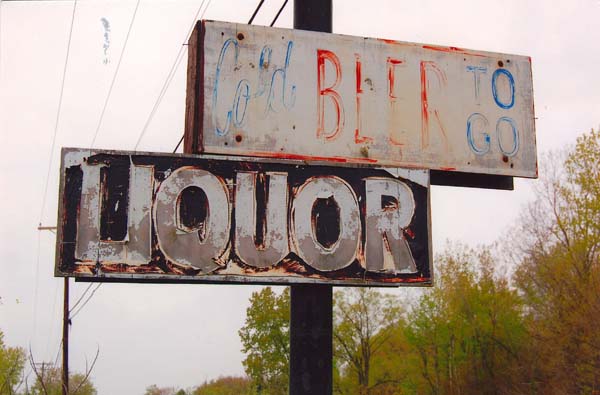
Cold Beer to Go / Liquor, art by David Thompson
News StoryBillie Louise Jones
A summer day, bright and hot and clear blue. Little puffs of clouds were blown toward the River so quickly they frayed; above them, long strips of clouds moved slowly in the opposite direction.
|

Motorcycle image by John Yotko
In Media ResBillie Louise Jones
Night sounds muted by the kind of slight drizzled that hardly counts for rain in New Orleans. Through the window, over the balcony, across the street, five or six voices talking all at once, contentious, though it was not clear what the quarrel was about. A fine edge of hysteria cut through the other voices, a jabbering shriek. The other voices then seemed to be arguing over how to calm the one voice.
|

Centre, art by the HA!man of South Africa
The Price of LifeAmanda Berthault
I wonder what it will feel like when I shove the knife into T.J. Price’s chest. Will it be hard and crunchy as I bust through his ribs? Or will it go smooth like slicing through cookie dough? I wish I knew. But I suppose the surprise of it will make the deed more exciting.
The pause was too long. The droolfest in the main room was looking pretty overwhelming for T.J., so I hoped he’d see that at least one of his fans was actually sane.
I stared at the screen. It wasn’t like I had asked for a full-blown lesson. I’m the only one who can sing like me. What a crock.
I left the chat room without waiting for a response.
|
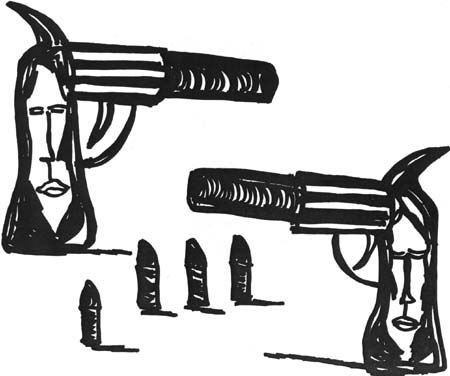
Weapon of Choice, art by Edward Michael O’Durr Supranowicz
Through the IceJim Meirose
They stood on a windswept rise just above the brook. Along the shore ice gripped the cattails and lily pads and skunk cabbages. From there the brook ice stretched out glistening under the dim cold winter sun. Blueyed Gurty looked up at her father.
|

Jim Meirose bioHis short work has appeared in many literary magazines and journals, including Alaska Quarterly Review, New Orleans Review, South Carolina Review, and Witness. A chapbook of his short stories has a released in October 2010 by Burning River. His work has been nominated for the Pushcart Prize, and the Shirley Jackson Award. One of his stories was cited in the O. Henry awards anthology.
|
The Donut PartyJ. Kent Allred
“So, do you collect comic books or jazz albums,” Tim politely asked Omar, the new employee in our market’s produce department.
|
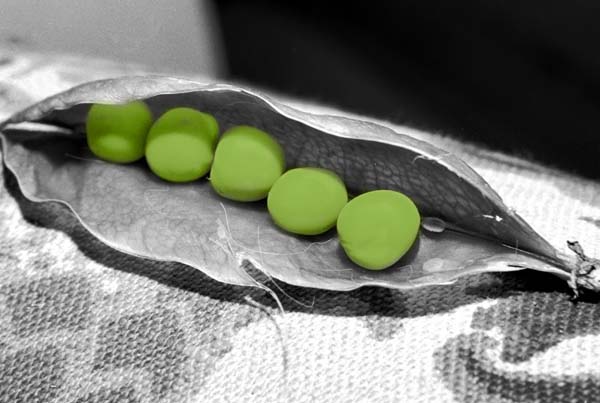
Peapod, art by Peter Bates
with additional artwork at PixelPost
The SleeperSonia Segura
One wrong move and I was for sure going to end up flat as a pancake! While the climb up the Ural mountains of Russia had seemed like a piece of cake, the inside of the tallest peak Mount Naordnaya was another thing! What had I been thinking?! Obviously I hadn’t! Or else I would not find myself in this predicament!  Eight, art by Mark Graham
The story was incredible! I told my uncle that I had loved it! All at once with the most serious face I had ever seen on my uncle, he told me it was real! He told me how he had found those manuscripts, while exploring a cave in the mountains in Russia. Even though he lost the old manuscripts in a cave-in and almost lost his life, he had read them and they told of the story of the two brothers. He had also done some asking around at the village located at the bottom of the mountain. The villagers were not very forthcoming in their answers. They were very superstitious. The story had happened about four to five hundred years ago. Some of them spoke of how a few years ago, one of the elders had come across a tomb made of ice in a cave. 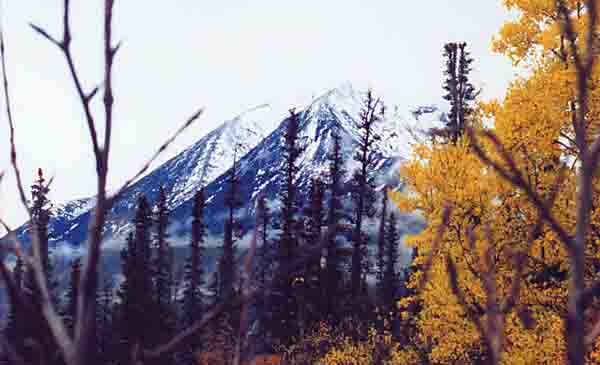


All of a sudden I felt the air shift! I felt like I was being lifted in mid air, but I just couldn’t believe what I was experiencing, and somehow I was being held gently and felt safe. Next thing I knew I was in a room in a lower part of the cave. There was ice all around and in the middle was what looked like an Egyptian sarcophagus but made of ice, so it was transparent. And in that sarcophagus was a man! At that moment I thought about the story that my uncle had been told! I was actually seeing a legend and couldn’t grasp it! It was the stuff of dreams! I walked towards him and I felt as if I had no choice. I wanted to go to him, I was compelled to go to him. When I was close enough to really see him, I was shocked! He looked like he was just taking a nap. And that’s not all, he was beautiful!
|

art by Eric Bonholtzer

Debra Purdy Kong, writer, British Columbia, Canada I like the magazine a lot. I like the spacious lay-out and the different coloured pages and the variety of writer’s styles. Too many literary magazines read as if everyone graduated from the same course. We need to collect more voices like these and send them everywhere.
Children, Churches and Daddies. It speaks for itself. Write to Scars Publications to submit poetry, prose and artwork to Children, Churches and Daddies literary magazine, or to inquire about having your own chapbook, and maybe a few reviews like these.
what is veganism?
vegan action
MIT Vegetarian Support Group (VSG)
functions:
For More Information Please Contact: Deborah Anderson dja@crest.org or (202) 289-0061
 
|